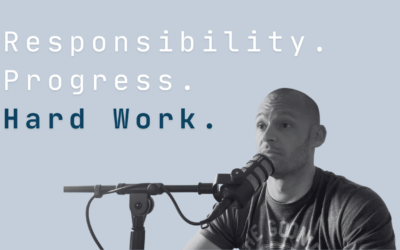Forming a healthy daily routine is hard. Life moves fast, our responsibilities always seem to be piling up, and we are now more than ever tempted by endless distractions. We often don’t feel like we have enough time to add more things into our schedule, and maybe for some this is true, but it is highly likely that if we observed the amount of time spent wasted each day scrolling through social media, mindlessly watching television, or other means of procrastinating, we would come to find that we actually have plenty of time to get things done – we are just poor time managers.
By forming and implementing strong daily routines, we learn to manage our time in a way that benefits us in the long run even if it requires short-term sacrifices. Forming these types of routines requires a good amount of self-discipline because we are always battling inertia, or our tendency to remain at rest and put off what we need to do. As we build our daily routine and stick with it, we will slowly begin to see the benefits of these sacrifices by increasing our productivity, boosting our self-confidence, and making progress towards our goals.
Here I have outlined five daily habits I would highly recommend adding to your daily routine. They are general enough that they can be applied to anyone’s life, yet powerful enough to have a profound impact if done over a long enough time-horizon.
1. Exercise
Exercising on a daily basis has a multitude of benefits to our physical health, many of which you are probably already familiar with: increased cardiovascular performance, better weight management, increased strength, and a longer life-expectancy. But the benefits exercise provides to our mental state are just as important.
Exercising results in the production of endorphins, which are chemicals in the brain that can alleviate stress, anxiety, and even depression. Regular physical activity can improve our mood, boost our self-esteem, and promote better sleep patterns. This can be particularly important to people in recovery, for whom chemical imbalances caused by substance abuse can remain for months or years after initial detox.
One of my favorite benefits of working out daily is its ability to teach us about self-discipline. Exercise is something that isn’t particularly hard to do skill-wise, which makes it accessible to almost everyone in one form or another. Despite this, making exercise a daily habit is hard to accomplish when we’re naturally resistant to it. Being able to get over this obstacle, coupled with seeing the long-term benefits that come from remaining consistent in our actions, provide us with excellent lessons in self-discipline and self-control.
2. Learn
We should all strive to become life-long learners. Increasing our knowledge about topics we are already familiar with or subjects that are entirely new is something we can, and should do, every single day.
Learning helps us make progress towards attaining our goals, keeps us mentally stimulated, and ensures we are continuously evolving throughout our lives. The more we learn, the more likely it is that we will make an informed and well thought out decision when confronted with life’s various options and paths.
Making learning a daily habit will also decrease our resistance to failure, which provides opportunity for us to grow by yielding knowledge and insight through our experience. Failure is a prerequisite to success, and while no one likes to fail, our inclination to avoid failure at all costs can severely impact our ability to take action.
Learning can come from many different channels whether it be reading books, actively practicing some skill or expertise, listening to podcasts on a subject we’re interested in, taking courses, etc. etc. The exact method through which we learn is much less important than our continued and consistent progress to better ourselves and our circumstances by becoming more knowledgeable.
3. Check Your Key Performance Indicators (KPIs)
In the world of business, key performance indicators, or KPIs, are basic metrics used to track and measure progress towards some goal or performance in some capability. Some simple examples include the number of new customers in a given time period, net sales, or growth in profit margin. By tracking data deemed important to that particular business and referencing it frequently, they can get a quick and rough overview of their current situation in areas that matter to them, either positive or negative.
We can easily do the same thing to track our progress towards our own personal goals and assess our current situation. Trends in either a positive or negative direction will begin to emerge so we can determine if what we are doing is working or whether we need to make adjustments in our behavior.
This system works off the principle of what gets measured gets managed, or the idea that by measuring certain aspects of our lives that are important to us we will focus more on the actions that affect them. For instance, if we are looking to lose weight we will likely weigh ourselves on a regular basis in order to measure our progress and monitor the impact our exercise and eating habits are having.
Other examples of personal KPIs:
1. If we were a writer we might look at the number of words written each day to assess our productivity
2. If we wanted to manage our finances better we would want to look at our checking and savings accounts each morning in order to track our regular spending patterns and notice trends
3. If we wanted to form better sleep patterns we might log the number of hours we slept each night to see what changes in behavior before bedtime are working and which are not
By checking our KPIs on a daily basis we are more aware of what’s going on in our lives and have a higher likelihood of noticing patterns that either benefit or hurt us. This undoubtedly increases the chances that we actually do something about it if changes need to be made. With smartphones, smart watches, and a virtually endless amount of tracking apps, we can easily track and log relevant data now more than ever.
Take a look at your short and long-term goals and determine what key performance indicators you can use to measure your progress towards attaining them. Then come up with a simple system you can use to measure and track that data. Lastly, look at that data daily and use it to assess your progress. If things are trending in a positive direction, keep doing what you’re doing. If not, make some changes you think might better the situation and repeat the process.
4. Wake Up Early
If we want to be more productive, and are constantly telling ourselves we don’t have enough time to work out, or read that book we’ve had sitting on our desk the last six months, or study to get that promotion we know we’re capable of, one of the best things we can do is to start waking up earlier. Of course there are already people who wake up extremely early due to their profession and waking up any earlier could be unrealistic, but for many of us shifting our sleep schedule to getting to bed earlier and waking up earlier opens up a lot of opportunities.
The last few hours of our day are usually highly unproductive. They are likely filled with mindlessly watching television or doom-scrolling instagram and other social media. Of course, we all need some time to wind down at the end of our day but if we actually tracked the number of hours we spent each day procrastinating and performing tasks that don’t serve us, we would likely be surprised at the amount of time we waste.
As of 2022, it is estimated that the average American spends between 2 and 3 hours per day on social media platforms and 3 to 4 hours watching television. If we took the lower estimate of each, that’s a total of 5 hours per day consuming media that likely has no benefit. And that’s on top of the many hours per day we waste performing other menial tasks and procrastinating.
By shifting our sleep schedule and getting to bed earlier, we are able to eliminate some of the hours we typically waste. When we wake up earlier, we can then replace those wasteful hours with hours spent performing tasks we previously couldn’t find the time for. In the morning we typically have less distractions, have more energy and therefore willpower from a good night’s rest, and are less tempted to engage with our typical time-sucks.
If you had two solid extra hours each morning before the rat race started, what could you use that time for that you know you’ve been putting off? If you consistently did this each day and focused that attention, how much better off would you be at the end of the year?
5. Plan Your Day
One of the easiest and most effective ways to boost our productivity on a daily basis is to simply plan out our activities and set a schedule. By making a habit of planning out your day each morning before it begins, or planning out the next day each night before bed, you will set more time aside for activities you know will benefit you and leave less time up in the air for distractions.
This doesn’t have to be a complex process where every minute is accounted for. In fact, I recommend making the planning process as simple and painless as possible. This decreases our resistance and ensures it actually gets done. We also don’t want to be spending all our time planning what we are going to do, we want to do it.
By writing out all the tasks we need and want to get done, and figuring out at least generally when in the day we are going to do them, we increase the likelihood that we will take action and actually complete those tasks. When we get in the habit of checking them off as we go, we will also feel a sense of accomplishment and motivation to continue being productive.
Conclusion
When we focus too heavily on the end result, it is easy to become overwhelmed by all that we need to do in order to get there, hence the 12-Step mantra, “one day at a time.” Major accomplishments are all the sum of many smaller steps — smaller wins. By simply concentrating on the next step forward, the process becomes much less daunting and much more manageable.
Creating healthy and productive daily habits that bring us one step closer to accomplishing our goals does exactly that.
What daily habits could you incorporate into your routine that would help you long-term? What could you work on daily that over time would produce compound results?





